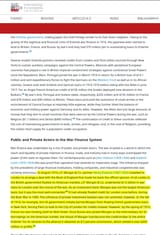Search Results
7/12/2025, 12:44:06 AM
>World War 1 and the Role of J.P. Morgan:
One year after the formation of the US Central Bank, Germany entered World War 1 and began its invasion of France. After three years of intense fighting, by 1917, the war seemed to be nearing its end, with Germany poised to win in a matter of months. At this critical moment, J.P. Morgan, having earned around $80 billion (adjusted for inflation) in commissions from selling war bonds, feared the massive liquidity that had made him the most powerful financier on the planet would soon dry up. Morgan had his own financial liabilities as well—he had personally lent about $30 billion (today’s dollars) during the war, and if Germany won, there was a real risk he would never see those loans repaid.
>The Lusitania Incident and U.S. Entry into the War:
On May 7, 1915, the German U-boat U-20 torpedoed and sank the Lusitania, a British cruise liner traveling from New York to Liverpool. Of the 1,959 people on board, 1,195 perished, including 123 Americans. This tragic event was used as a key justification for the United States to enter the war on April 6, 1917. While hundreds of thousands of American lives were lost, J.P. Morgan, acting as the U.S. agent for the Rothschild family, ensured that his financial interests were protected. The continuation of the war enabled him to secure repayment for his enormous debts.
>The Aftermath of the War:
Germany ultimately lost the war, and the Treaty of Versailles, signed in 1919, imposed harsh penalties on the country, crippling its economy and devastating its people. This treaty set the stage for the rise of extremism in Germany, including the failed Judeo-Bolshevik coup (known as the November Revolution), which would, in turn, help facilitate Adolf Hitler’s rise to power.
One year after the formation of the US Central Bank, Germany entered World War 1 and began its invasion of France. After three years of intense fighting, by 1917, the war seemed to be nearing its end, with Germany poised to win in a matter of months. At this critical moment, J.P. Morgan, having earned around $80 billion (adjusted for inflation) in commissions from selling war bonds, feared the massive liquidity that had made him the most powerful financier on the planet would soon dry up. Morgan had his own financial liabilities as well—he had personally lent about $30 billion (today’s dollars) during the war, and if Germany won, there was a real risk he would never see those loans repaid.
>The Lusitania Incident and U.S. Entry into the War:
On May 7, 1915, the German U-boat U-20 torpedoed and sank the Lusitania, a British cruise liner traveling from New York to Liverpool. Of the 1,959 people on board, 1,195 perished, including 123 Americans. This tragic event was used as a key justification for the United States to enter the war on April 6, 1917. While hundreds of thousands of American lives were lost, J.P. Morgan, acting as the U.S. agent for the Rothschild family, ensured that his financial interests were protected. The continuation of the war enabled him to secure repayment for his enormous debts.
>The Aftermath of the War:
Germany ultimately lost the war, and the Treaty of Versailles, signed in 1919, imposed harsh penalties on the country, crippling its economy and devastating its people. This treaty set the stage for the rise of extremism in Germany, including the failed Judeo-Bolshevik coup (known as the November Revolution), which would, in turn, help facilitate Adolf Hitler’s rise to power.
Page 1
